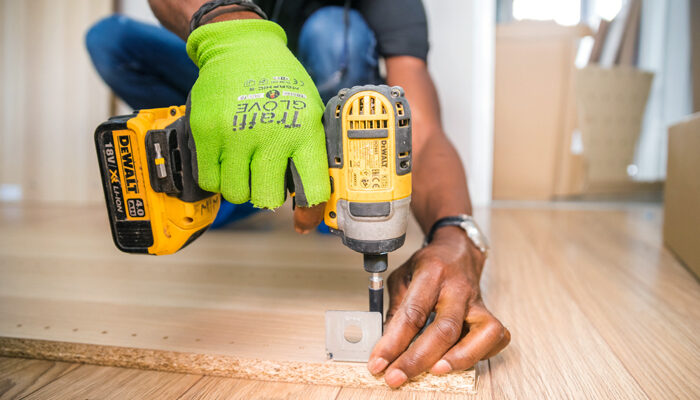
Every home should have a handy toolbox for coping with easy fixes and minor household emergencies. If you’re just setting up house for the first time and haven’t really been into DIY before, this article will help you to shop for the basics. An, once you’ve done a few repairs to your own satisfaction, you might just decide to put those tools to more intensive use. After all, it’s a super-rewarding and practical hobby to have! Start with easy DIY jobs and work your way up!
Hand Tools You Absolutely Need
There’s nothing worse than having ALMOST all the household tools you need when you need to spring into action. Using the right tool for each job makes it easy – trying to improvise with kitchen utensils or the like is just frustrating. These basics should keep you covered:
Measure and Align: A good measuring tape is a basic you shouldn’t overlook, but it’s also important to ensure that you’re getting things straight – in this instance, you need a spirit level. A metal straight-edge with marked measurements is also a handy thing to have when you need to get things straight and neat.
A general-purpose hammer: Having a hammer may seem obvious, but if you’re new to buying tools, you may be surprised to see just how many sizes and types of hammers there are. Choose a straightforward, medium weight hammer for a start. If you think you might be doing more delicate work, a smaller one can come in handy for tight spaces and finer tasks.
Screwdrivers: Choose good-quality screwdrivers and buy a neat screwdriver set with all the likeliest types and sizes of screwdriver you may need. Beware of cheap screwdrivers – the handles are inclined to break quickly, and it’s not-unheard of to snap a screwdriver if the quality of the metal is poor.
Pliers and wire cutters: You need at least two different kinds of pliers in your toolbox: needle-nosed pliers are a must for getting into tight spaces and doing finer tasks. A heavier, grooved plier will help with the bigger jobs. As an optional extra, consider adding a vise-grip pliers to your set. Wire cutters are handy to have too. Most pliers allow for cutting, but wire cutters allow you to do a neater, more precise job.
Spanners and Alen keys: Get a grip on screws and bolts with a basic spanner set and a set of hex keys. Some sizes see more use than others, but a basic set should cover the most commonly found sizes you’ll need.
Utility Knife: This little guy is a must. From arts and crafts to household DIY, expect it to see quite a lot of use. Get spare blades while you’re at it.
Saws: Once again, we’re looking at a vast array of sizes and styles of saws. For a basic toolkit, a small hacksaw and mid-sized carpentry saw should be sufficient.
Nails, Screws, Tape and Other Consumables
Invest in a general-purpose set containing different sizes of screws and nails. Remember that there’s a difference between carpentry and masonry nails. You might still find yourself looking for some unusual sizes and types, but your set should contain all the commoner types.
Painters tape, plumbers tape, and double-sided tape are handy to have around. Choose a good-quality brand since not all tapes and adhesives are created equal.
Fillers and putty are sometimes good to have, but these products don’t always have a good shelf life – wait until you need them before you buy them. Glue doesn’t last forever either, but having a good contact adhesive in your toolbox can be a big help. The same goes for super glue.
Power Tools
Power tools make tasks so much easier. However, if you’re only thinking about emergency repairs and minor projects, start with your drill. Choose a cordless drill with adjustable speed and action and opt for a well-known brand. A mid-priced drill is probably good enough, but be careful of cheap drills unless they’re from a well-known brand that’s being offered at a reduced price.
Safety Gear
The safety gear you choose will depend on the tools you’re using and the type of task you’re undertaking. For our basic toolbox, a pair of goggles is the only real necessity. Protect your eyes whenever flying debris could pose a hazard.
As you invest in additional power tools, do remember to check which safety gear is applicable. DIY should be about a sense of achievement – not injuries!
Leave a Reply